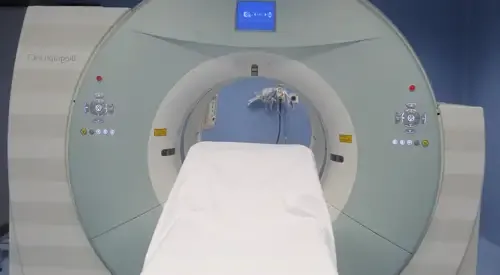Vascular dementia
"To prevent the progression of vascular dementia it is essential to identify and treat cardiovascular risk factors such as hypertension, hypercholesterolemia, diabetes, obesity or smoking".
DR. ADOLFO JIMÉNEZ HUETE
SPECIALIST. NEUROLOGY DEPARTMENT

Vascular dementia is the second cause of dementia after Alzheimer's disease, accounting for 15-20% of the total. It encompasses a heterogeneous group of entities that cause cognitive impairment due to cerebrovascular pathology.
Vascular dementia can occur as a consequence of an extensive cerebral infarction or a heart attack, which, without being of great size, involves strategic cerebral regions in the cognitive processes.
It can also appear as a consequence of the repetition of small cerebral infarcts that, when accumulating, progressively deteriorate the cerebral tissue and the connections between neurons. Other times, it is produced as a consequence of a cerebral hemorrhage or, more infrequently, by hereditary disorders such as CADASIL (cerebral autosomal dominant arteriopathy with subcortical infarcts and leukoencephalopathy).
Furthermore, it is not uncommon for vascular dementia to have a disgusting neurodegenerative component, due to a concomitant Alzheimer's disease, which we usually refer to as mixed dementia.

What are the symptoms of vascular dementia?
The symptoms of vascular dementia are highly variable since they depend on the location and extent of the cerebrovascular damage.
The most common symptoms are:
- Difficulty in focusing and maintaining attention.
- Decreased ability to plan.
- Decreased speed of information processing.
- Memory problems.
- Disorientation in time or space.
- Apathy, depression and mood swings (emotional lability).
- Irritability and aggressive behavior.
In addition to cognitive and behavioral symptoms, some patients with vascular dementia may also have problems walking, difficulty swallowing or articulating speech, and urinary incontinence.
Unlike Alzheimer's disease, which presents a gradual and progressive deterioration, in vascular dementia the course of the disease can be staggered, with abrupt worsening, as a result of the appearance of new cerebral vascular events.
Do you have any of these symptoms?
You may have vascular dementia
How is vascular dementia diagnosed?

The diagnosis of vascular dementia requires a detailed clinical interview, neurological examination and cognitive assessment.
In the interview it is important to find out if there are any vascular risk factors or family history of stroke, vascular disease or dementia.
A brain scan and imaging tests such as a computed tomography (CT) scan or preferably a brain MRI are also needed.
Given that the symptoms of presentation may be similar to those of Alzheimer's disease, the use of biomarkers (PET-FDG and amyloid PET and/or analysis of Alzheimer's disease markers in cerebrospinal fluid) is indicated in case of diagnostic doubts.
How is vascular dementia treated?
Identifying and treating cardiovascular risk factors, such as hypertension, hypercholesterolemia, diabetes, obesity, and smoking, is essential to prevent the progression of vascular dementia.
In many cases it is indicated to add drugs that prevent the formation of thrombi (antiaggregants, such as acetylsalicylic acid) or prevent cerebral embolisms (anticoagulants).
In those patients with a mixed dementia (vascular dementia and concomitant Alzheimer's disease), symptomatic drugs known as acetylcholinesterase inhibitors (galantamine, donepezil or rivastigmine) can be used. In many cases it is necessary to also associate other drugs (e.g. antidepressants) for the control of behavioral symptoms.
On the other hand, several studies support the beneficial effects of regular exercise and, as in other types of dementia, cognitive stimulation.
Where do we treat it?
IN NAVARRE AND MADRID
The Department of Neurology
of the Clínica Universidad de Navarra
The Neurology Department has extensive experience in the diagnosis and multidisciplinary treatment of neurological diseases.
We offer a diagnosis in less than 72 hours, along with a proposal for personalized treatment and post-consultation follow-up of the patient by our specialized nursing team.
We have the most advanced technology for an accurate diagnosis with cutting-edge equipment such as HIFU, deep brain stimulation devices, video EEG, PET and epilepsy surgery, among others.

Why at the Clinica?
- State-of-the-art diagnostic assistance with great work in research and teaching.
- Specialized nursing team.
- We work together with the Sleep Unit.


















